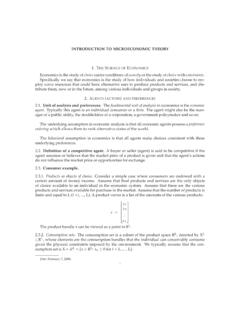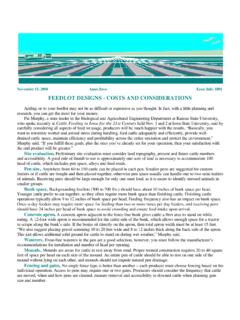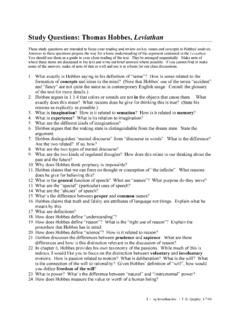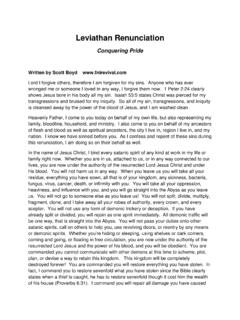Transcription of CHAPTER XIII — OF THE NATURAL CONDITION OF …
1 LeviathanChapters 13 151by Thomas HobbesCHAPTER xiii OF THE NATURAL CONDITION OF mankind ASCONCERNING THEIR FELICITY AND MISERYNATURE hath made men so equal in the faculties of body and mindas that, though there befound one man sometimes manifestly stronger in body or of quicker mind than another, yet whenall is reckoned together the difference between man and man is not so considerable as that one mancan thereupon claim to himself any benefit to which another may not pretend as well as he. Foras to the strength of body, the weakest has strength enough tokill the strongest, either by secretmachination or by confederacy with others that are in the same danger with as to the faculties of the mind, setting aside the arts grounded upon words, and especiallythat skill of proceeding upon general and infallible rules,called science, which very few have andbut in few things, as being not a native faculty born with us, nor attained, as prudence, while welook after somewhat else.
2 I find yet a greater equality amongst men than that of strength. Forprudence is but experience, which equal time equally bestows on all men in those things theyequally apply themselves unto. That which may perhaps make such equality incredible is buta vain conceit of one s own wisdom, which almost all men thinkthey have in a greater degreethan the vulgar; that is, than all men but themselves, and a few others, whom by fame, or forconcurring with themselves, they approve. For such is the nature of men that howsoever they mayacknowledge many others to be more witty, or more eloquent ormore learned, yet they will hardlybelieve there be many so wise as themselves; for they see their own wit at hand, and other men s ata distance.
3 But this proveth rather that men are in that pointequal, than unequal. For there is notordinarily a greater sign of the equal distribution of anything than that every man is contented withhis this equality of ability ariseth equality of hope in theattaining of our ends. And thereforeif any two men desire the same thing, which nevertheless theycannot both enjoy, they becomeenemies; and in the way to their end (which is principally their own conservation, and sometimestheir delectation only) endeavour to destroy or subdue one another.
4 And from hence it comes topass that where an invader hath no more to fear than another man s single power, if one plant,sow, build, or possess a convenient seat, others may probably be expected to come prepared withforces united to dispossess and deprive him, not only of the fruit of his labour, but also of his lifeor liberty. And the invader again is in the like danger of from this diffidence of one another, there is no way for anyman to secure himself soreasonable as anticipation; that is, by force, or wiles, to master the persons of all men he canso long till he see no other power great enough to endanger him: and this is no more than hisown conservation requireth, and is generally allowed.
5 Also, because there be some that, takingpleasure in contemplating their own power in the acts of conquest, which they pursue farther thantheir security requires, if others, that otherwise would beglad to be at ease within modest bounds,should not by invasion increase their power, they would not be able, long time, by standing only1on their defence, to subsist. And by consequence, such augmentation of dominion over men beingnecessary to a man s conservation, it ought to be allowed , men have no pleasure (but on the contrary a great deal of grief) in keeping companywhere there is no power able to overawe them all.
6 For every manlooketh that his companion shouldvalue him at the same rate he sets upon himself, and upon all signs of contempt or undervaluingnaturally endeavours, as far as he dares (which amongst themthat have no common power to keepthem in quiet is far enough to make them destroy each other), to extort a greater value from hiscontemners, by damage; and from others, by the that in the nature of man, we find three principal causes of quarrel. First, competition;secondly, diffidence; thirdly, first maketh men invade for gain; the second, for safety; and the third, for reputation.
7 Thefirst use violence, to make themselves masters of other men spersons, wives, children, and cattle;the second, to defend them; the third, for trifles, as a word, asmile, a different opinion, and anyother sign of undervalue, either direct in their persons or by reflection in their kindred, their friends,their nation, their profession, or their it is manifest that during the time men live without a common power to keep them all inawe, they are in that CONDITION which is called war; and such awar as is of every man against everyman.
8 For war consisteth not in battle only, or the act of fighting, but in a tract of time, wherein thewill to contend by battle is sufficiently known: and therefore the notion of time is to be consideredin the nature of war, as it is in the nature of weather. For as the nature of foul weather lieth not ina shower or two of rain, but in an inclination thereto of many days together: so the nature of warconsisteth not in actual fighting, but in the known disposition thereto during all the time there is noassurance to the contrary.
9 All other time is therefore is consequent to a time of war, where every man is enemy to every man,the same consequent to the time wherein men live without other security than what their ownstrength and their own invention shall furnish them such CONDITION there is no placefor industry, because the fruit thereof is uncertain: and consequently no culture of the earth; nonavigation, nor use of the commodities that may be imported by sea; no commodious building; noinstruments of moving and removing such things as require much force; no knowledge of the faceof the earth; no account of time; no arts; no letters; no society; and which is worst of all, continualfear, and danger of violent death.
10 And the life of man, solitary, poor, nasty, brutish, and may seem strange to some man that has not well weighed thesethings that Nature shouldthus dissociate and render men apt to invade and destroy one another: and he may therefore, nottrusting to this inference, made from the passions, desire perhaps to have the same confirmed byexperience. Let him therefore consider with himself: when taking a journey, he arms himself andseeks to go well accompanied; when going to sleep, he locks his doors; when even in his househe locks his chests; and this when he knows there be laws and public officers, armed, to revengeall injuries shall be done him; what opinion he has of his fellow subjects, when he rides armed; ofhis fellow citizens, when he locks his doors; and of his children, and servants, when he locks hischests.



















